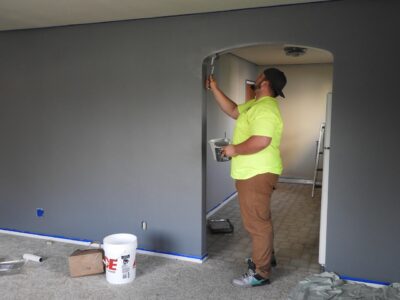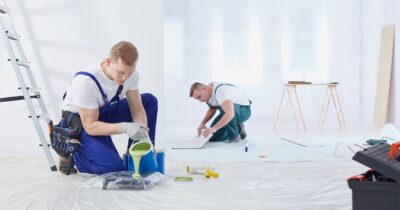Water damage is a homeowner’s nightmare, especially in bustling urban areas like Central Atlanta, where the blend of old and new housing can present unique challenges.
Whether it’s due to heavy rainfall, plumbing issues, or even just high humidity, the threat of water damage is ever-present.
But fear not! With a few proactive steps, you can safeguard your cherished belongings and keep your living space dry and comfortable.
Let’s dive into the ways you can protect your home and possessions from the menace of water damage.
1. Understanding the Risks and Preparing Ahead
Understanding the risks of water damage in your home is the first step towards protection. In Central Atlanta, where weather can be unpredictable, it’s crucial to be prepared. Start by inspecting your home for any signs of potential water entry points.
This could include checking for cracks in the foundation, ensuring your roof is in good condition, and verifying that windows and doors are properly sealed.
Next, consider your home’s interior. If you have a basement, it’s wise to avoid storing valuable items there, as basements are often the first to flood. Instead, use waterproof storage containers for essential documents and sentimental items and keep them on higher floors.
Elevating electronics and furniture slightly off the ground can also prevent damage in case of minor flooding.
Being prepared also means knowing what to do in case of a water-related emergency. Keep a list of emergency contacts, including a reputable plumber and a water damage restoration service.
Familiarize yourself with your insurance policy – knowing what is covered and what isn’t can save you a lot of headaches later.
2. Regular Inspections and Seeking Professional Help
Regular home inspections are vital in preventing water damage. Pay special attention to areas prone to water accumulation, such as basements, attics, and around appliances like washing machines and dishwashers. Look out for signs of leaks, dampness, or mould, as these can be early indicators of water issues.
In the event that you do notice signs of water damage, it’s crucial to act fast. The longer water sits, the more damage it can cause. This is where seeking professional help becomes invaluable.
We suggest getting in touch with the best Atlanta Water Damage Restoration company to streamline the process of recovery and repair. These experts are equipped with the tools and knowledge to effectively assess and address water damage, ensuring that your home and belongings are properly taken care of.
Remember, water damage restoration is not just about removing water. It’s about ensuring your home is safe, dry, and restored to its pre-damage condition. This can include everything from water extraction and drying to mould remediation and structural repairs. By getting in touch with a professional restoration service promptly, you’re taking a significant step in protecting your home and belongings.
3. Smart Landscaping and Exterior Maintenance
The exterior of your home plays a crucial role in preventing water damage. Smart landscaping and regular exterior maintenance can significantly reduce the risk. Start by ensuring your gutters and downspouts are clean and functioning correctly. This helps direct rainwater away from your home, preventing it from pooling around the foundation.
Next, consider the landscape around your house. Make sure the ground slopes away from your foundation to help water drain properly. Planting native vegetation can also help as these plants are adapted to the local climate and soil conditions, reducing the risk of erosion and water accumulation.
Regularly inspecting the exterior of your home is also crucial. Check for cracks in the foundation, damaged roof shingles, or any other signs of wear and tear that could allow water to enter your home. Addressing these issues promptly can prevent minor problems from turning into major water-damage disasters.
4. Indoor Humidity Control and Ventilation
Maintaining a healthy level of humidity inside your home is essential in preventing water damage. High humidity can lead to condensation, which, over time, can cause mould growth and damage to walls, ceilings, and belongings. Use dehumidifiers in areas prone to high humidity, like basements, and ensure your home is well-ventilated, especially in bathrooms and kitchens where moisture is common.
Regularly check your HVAC system and ensure it’s functioning correctly. An efficient HVAC system
not only regulates temperature but also helps in controlling indoor humidity levels. In addition to mechanical ventilation, natural ventilation can be beneficial. Open windows when the weather permits to allow for air circulation, which can help keep humidity levels in check.
It’s also smart to use exhaust fans in your kitchen and bathrooms. These fans help to remove excess moisture that can accumulate from cooking and showering, reducing the risk of mould growth and water damage. Be vigilant about any signs of excessive humidity in your home, like condensation on windows or a musty smell, as these can be indicators that your humidity levels are too high.
5. Emergency Preparedness and Response
In Central Atlanta, where weather can be unpredictable, having an emergency response plan for water damage is crucial. Start by assembling an emergency kit with essentials like water, non-perishable food, flashlights, and a first-aid kit. Also, include important documents like insurance papers and emergency contact numbers.
Educate yourself and your family on how to shut off your home’s main water supply. In case of a major leak, this can prevent further damage until help arrives. If you experience flooding, prioritize safety first. Avoid entering flooded areas, especially if the water might be in contact with electrical outlets or appliances.
Stay informed about local weather conditions, especially during seasons prone to heavy rains or storms. If severe weather is forecasted, take preemptive measures like securing outdoor furniture, checking sump pumps, and ensuring your emergency kit is accessible.
Conclusion
Protecting your belongings from water damage in Central Atlanta requires a combination of proactive measures, regular maintenance, and preparedness. By understanding the risks, conducting regular inspections, maintaining your home’s exterior and interior, controlling indoor humidity, and having an emergency response plan, you can significantly reduce the risk of water damage.
Remember, in cases where damage does occur, contacting a professional restoration service can be a crucial step in efficiently restoring your home. Stay vigilant, be prepared, and keep your home and possessions safe from the unpredictable nature of water damage.










